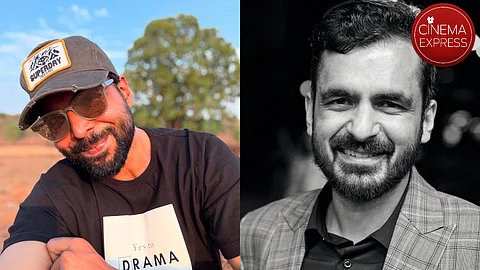

Abhishek Banerjee balances it well. Last year, he reprised his role of the audience-favourite Jana in the rip-roaring Stree 2. While the horror-comedy was in theatres, parallelly was playing the action-thriller Vedaa, in which Abhishek, contrastingly, essayed the role of a cruel antagonist. Now, he returns to the hinterland thriller genre with Karan Tejpal’s debut directorial, Stolen. Most actors, once they smell big-budget, find it tough to go back to their more indie, content-driven roots. The reasons can be ample: public perception, personal ambitions, and market requirements. Abhishek, however, keeps it simple. For him, it all boils down to real estate. “Once you move to this city (Mumbai), your success is measured by the number of rooms you have in a housing society,” he says. “If you get out of the mindset of constantly levelling up from one to two or two to three BHK apartments (probably by buying a house in Goa) and only focus on the number of good films and good characters you do, it becomes easier.”
In Stolen, Abhishek plays Gautam, a man who thinks from his wallet and for whom upward mobility might be the only philosophy in life. A good deed by his younger brother Raman (played by Shubham Vardhan) doesn't go unpunished, and soon, the siblings find themselves being chased by a WhatsApp-wildered lynch mob. While Gautam is a stand-in for the risk-averse urban elite, Raman is the driving conscience of the film. Abhishek was initially roped in for the latter. “I wanted to play Raman because he was giving me the opportunity to portray a righteousness that I might not be able to showcase in real life,” he says. The universe, however, had other plans. The actor who was supposed to play Gautam dropped out, and Abhishek was then approached for the elder brother’s role. “I was so married to Raman that I initially said no,” he says. “But then I eventually came around, and when I played Gautam, I realised that the character has this beautiful arc, an impactful journey that he goes through.”
“I convinced him once, then I had to do it all over again,” interjects Karan, the director, with a laugh. Stolen is Karan’s first feature directorial. Previously, he has worked as an assistant director on Rajkumar Hirani’s 3 Idiots (2009) and Lage Raho Munna Bhai (2006), amongst others. The seed of the film’s idea was sown in Karan’s head when he saw a chilling video of two men being lynched by a mob in Assam’s Karbi Anglong area in 2018, over unfounded suspicions of them being child kidnappers. “I connected with those two boys because they came from a socio-economic background just like mine,” he shares. “They had gone fishing in a remote region. Something I do a lot with my friends. And then, seeing them being killed in such a brutal and unjust manner…it shook me.”
The film, for all its edge-of-the-seat telling and pacy momentum, is still a content-driven product lacking the market value of a big star, something which has sadly become a non-negotiable for a theatrical release. It, however, has the stamp of approval from four distinguished directors: Anurag Kashyap, Vikramaditya Motwane, Kiran Rao, and Nikkhil Advani, who came aboard the project as executive producers. “The four of them coming together gave the film a fresh validation, a credibility. Their backing automatically curates the movie for an audience constantly inundated with choices. It gives them trust if their favourite directors are backing it.”
It is also increasingly becoming difficult to make gritty, realistic cinema. With a volatile box office, we don’t get the likes of NH10 (2015) and Udta Punjab (2016) in theatres. There is also the axe of censorship dangling over anything that tries to present things as is. “I am not the kind of filmmaker who is afraid of censorship,” says Karan. “Because historically, you see, whenever the state tries to put extra control over any medium, artists find novel and beautiful ways to express themselves within those shackles. I mean, just look at Iran.”
Abhishek adds, “I feel rooted stories are still in. It’s just that they have shifted base from theatres to OTT, which, in a way, gives them a wider audience. The problem is that these films are still being seen as the artsy type. The challenge is to make them the mainstream.”